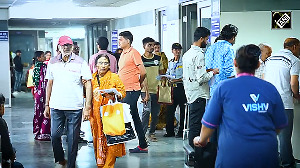The 2008 Union Budget must be remembered. Not because it heralds the news of an early election. But because it comes at a time when the world is battling four different but linked developments.
First, the impending US recession, which is already costing our financial markets to tumble.
Second, record oil price hikes.
Third, sky-rocketing prices of foodgrain in the international market. This week, the price of rice has surged to a 20-year high, touching $500 per tonne for the first time since 1969. The price of wheat within the last eight months has risen 88 per cent.
The fourth global development is climate change, which is already rearing its evil head in terms of the intensification of extreme and variable weather events -- from tropical cyclones, heavy rains leading to floods, bitter cold spells and frost which is killing crops.
The fact is that no finance minister can, in this interconnected and globalised world, design domestic policies without accounting for these developments. The fact also is that in Budget 2008, only one development, namely, the US sub-prime crisis has been given consideration. Not only is the 'turbulence' of the financial markets explicitly mentioned in the FM's speech, his consumption-oriented Budget is designed to respond to this crisis.
But this is a myopic view of the global situation. These developments are inter-linked, are already playing out in the world and will impact our lives. We will have to design for complexity and even uncertainty.
On the one hand, the rising price of oil (and its politics of ownership) is leading governments to discuss the imperative of national energy security. On the other, climate change is forcing the issue by demanding alternatives to fossil fuels.
The answer to both challenges has been to subsidise the growing of biofuels -- ethanol from maize and sugarcane, and biodiesel from edible oil crops. The scale and pace of change is phenomenal. In the last few years, the US has diverted about 20 per cent of its maize crop to biodiesel, and the price of the crop has risen by 60 per cent.
The inter-play for these developments is important to understand. Part of the increased price of wheat is its use as a feed-substitute for the out-priced maize. The other part is climate-related as the drought in Australia and other weather-related events have brought world wheat stocks to a never-before low. The world is designing responses and dealing with impacts simultaneously.
But the Budget provides petty answers to big changes. Take the loan waiver to farmers. The question is if this write-off will help farmers in times of agrarian crisis and the country in times of increasing food prices.
The answer is clearly no. We have done everything to ensure that costs of inputs needed for growing food have increased, which means that this one-time loan waiver means nothing. Farmers have no option to take loans to build irrigation facilities -- wells -- because public infrastructure does not exist.
Today over three-fourths of Indian agriculture is irrigated using groundwater on assets created by the farmer and not the government. As water levels decline, costs of pumping increase. The list goes on. But let's accept the fact that the cost of growing food is increasing each day and that this will continue to push farmers to take loans to survive.
But if international food prices are increasing, our farmers should benefit. High prices will compensate for higher input costs. But India is a poor nation -- food prices will cost our economy. We cannot also afford any more to import the quantities of food that we were once hoping to do.
The government has already banned the export of critical food items and even put a price bar on the export of basmati rice. It also uses the minimum price index to fix and, therefore, depress the prices of each commodity. It is no wonder that even as world food prices have increased by over 25 per cent in the last year, in India the price has increased by less than 6 per cent.
The government will have no option but to do more of the same -- control food prices -- to check inflation. In this situation, the move to waive farmer loans is not just meaningless, it is a joke.
To add salt to the rising oil cost injury, the finance minister makes the small car cheaper. He does not exempt the bus from paying excise. This is not just a joke, it is a cruel joke.






